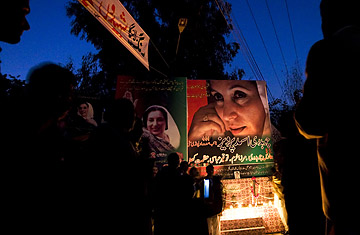
Supporters of Pakistan's slain opposition leader Benazir Bhutto pray at the site where she was killed to commemorate the first anniversary of her assassination in Rawalpindi, Pakistan
(2 of 2)
Since Bhutto's assassination, Pakistan has continued to lurch from crisis to crisis. Widespread hopes that a return to civilian rule would restore some stability to the country have long since dissipated, with 88% of Pakistanis polled saying that the country is "headed in the wrong direction," according to a recent survey published by the International Republican Institute. Islamist militants — who have staged over 50 bomb attacks this year — continue to raise havoc across the northwest and are growing restive in southern Punjab. Meanwhile, amid the winter cold, power shortages routinely plunge even major cities into darkness. A recent International Monetary Fund bailout package has staved off bankruptcy, but its attendant conditions will see growth slow further. And as cracks begin to show in Zardari's coalition, some members of his party privately fear that the government may not last until March 2009 — the scheduled date for Senate elections, where Zardari's People's Party of Pakistan is hoping to capture greater control of parliament.
The government's handling of the post-Mumbai crisis has scarcely helped its position, observers say, citing a string of inconsistent statements by the Zardari government. For example, within hours of the announcement that the chief of the ISI would be dispatched to New Delhi, the army overruled the move. Ministers said that they had Masood Azhar — the leader of the banned militant organization Jaish-e-Muhammad — in their custody, only to later claim that he was still on the run. After the alleged incursion by Indian jets into Pakistani airspace, Zardari tolerantly described it as a mere "technical violation." The Pakistani Foreign Ministry, however, later registered a formal protest.
While these retreats may in part stem from an uneven grasp of statecraft, they also appear to reflect pressure from the army. As Pakistan's most powerful institution, it has traditionally directed defense and foreign policy, even during times of civilian rule. General Ashfaq Kayani, the army chief, has sedulously cultivated an image of himself as a demure, professional soldier content with keeping a distance from politics. But according to one Zardari aide, "the traditional friction between the military and civilian governments is there."
When General Kayani was elevated to the army's top post, he inherited the reins of an institution with a tarnished domestic image as a result of the Musharraf years. In just over a year, it appears to have recovered much lost ground. Last September, it was Kayani who led protests against a U.S. ground incursion that killed civilians in Pakistan when it was supposed to be aimed against militant forces waging war across the border in Afghanistan. The move was cheered by many Pakistanis. Over recent weeks, with rising Pakistani nationalism — keenly promoted by the local media — the army has been showered with praise as public opinion has closed ranks behind it.
Confronted by conflicting demands from the army, public opinion, allies and neighbors, it is little wonder that Zardari abandoned his signature high-voltage smile on Saturday. He is not only grieving for his wife. The confrontations ahead in 2009 — with India and with his military — must weigh heavily.
